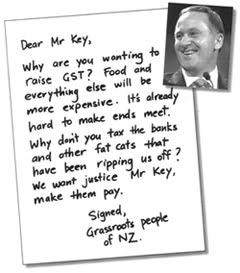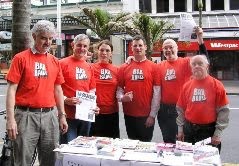by Mary Bottari
from
PR Watch.org
26 October 2009
With the newspapers full of talk about “zombie” banks and parasitic “vampire squid” financial institutions, it was particularly fitting that the “Showdown in Chicago” started with a ghoulish group of zombies rocking out to Michael Jackson's “Thriller.” Chicago's own South Shore Drill Team opened the three days of banks protests with a bang and had the crowd of thousands of activists dancing in no time.
The Showdown promises to be the first major American protest against the banks since the financial meltdown in September 2008. Thousands are expected to join three days of educational activities and the large march on Tuesday to the American Bankers Association (ABA) convention at the downtown Sheraton hotel.
The Reverend Eugene Barnes of the Central Illinois Organizing Project opened the evening’s festivities, stating:
“Welcome to the Showdown in Chicago, we have come together to reclaim America and hold Wall Street accountable. Imagine a story as terrible as this, the same financial institutions that created the crisis, sent the economy into a tailspin, handed out bonuses on top of bonuses, and needed hundreds of billions of dollars of taxpayers money, are back in business as usual. They are spending millions on Capitol Hill trying to defeat legislation that would help ordinary people and strengthen our economy. Each of us has traveled here to Chicago today because we will not stand what is being done to our families and communities. If we needed confirmation that we are all in this together, the financial crisis caused by Wall Street is living proof. Everyone has been impacted by the greed of the big banks. Bank-owned properties are littering our communities, rising unemployment, sky-high credit card interest rates, payday loans at 1,000% interest, and not to mention billions of dollars in lost pensions. It is a sad fact when you are 65 years old and you realize you have to go back to work. We have come here in Chicago because we are sick and tired of being sick and tired, but we are also here because we have hope because we know America can do better. It is time to put people first.”
Here is a smattering of the speakers who followed:
* Tom Balanoff, the President of Service Employees International Union (SEIU) Illinois, noted that not a single person in this room caused the economic crisis. He reminded the crowd that it was appropriate that they were are starting this movement for reform of the financial system in the same city where the push for an eight-hour workday began and spread around the globe, referring to the 1886 Haymarket massacre.
* U.S. Senator Dick Durbin of Illinois demonstrated that he was in touch by showing up and telling harrowing tales of hard-working constituents who had been scammed by adjustable rate mortgage firms. Even though the Senate failed to pass legislation that would have allowed judges the discretion to modify mortgages to help keep people in their homes, Senator Durbin said he had not giving up the fight. He also hinted that he working on some new approaches, including an idea that would allow families whose homes have been foreclosed on to rent their own homes from the banks, keeping them off the streets and keeping the homes occupied and cared for. He noted, “We are working on this idea, and it would be helpful if one bank would step up to the idea.”
* And, the audience heard from regular folks as well: people caught in the payday loan trap, like Mitzi Rivers-Singleton of Witchita, Kansas, who finally worked her way our of crippling debt with the help of a credit union and a local community group. She said, “I stand with you toe to toe up against big banks. I want to let the know that enough is enough, so I tell my friends and family you don't go there. You have other options.”
But this was the warm up act. After the welcoming comments, the activists took to the streets. Carrying signs featuring Dorothea Lange’s famous photo of a Depression Era mom with her two children. The activists marched through the streets to the Sheraton where the ABA was meeting, chanting: “ABA, you’re the worst! It’s time to put people first!” And, “Bailout? No, thanks! Bust up big banks!” And, “Enough is enough!” Huge posters portraying Jamie Dimon of JPMorgan and Citigroup’s Vikram Pandit were part of the crowd.
The rambunctious, but peaceful, crowd gathered outside the hotel, quickly attracting a large police presence. At least seven luxurious limousines pulled up in front of the Sheraton, but their parties seemed reluctant to appear and face the crowd. Soon a large group of well-dressed people exited the Sheraton chanting. At first, this reporter was confused. Could this be the bankers rushing their own limos? But when I recognized Hugh Espey of Iowa Citizens for Community Improvement, it became clear that these were protestors, too. They were chanting: “We’ll be back!” Later, “We laid low in the building all day until we simultaneously converged on the lobby and burst into changes. It was all very quiet and then all of a sudden it was very loud,” Espey said with a grin on his face.
Aretha Franklin was a theme of the evening as a singer performed “Think” at the Showdown conference, and one activist sang “Shame, shame, shame on you,” to the tune of her song “Chain of Fools” in front of the Sheraton. Oddly enough, none of the Banksters seemed to share the sentiment.
The protestors attempted to deliver a letter to ABA President Edward Yingling listing their concerns and demands, but no representative of the ABA would come out to accept the letter, guaranteeing that the protestors would try again later.
See also moves in Britain to break up big banks, go to Government to break up the banks.








